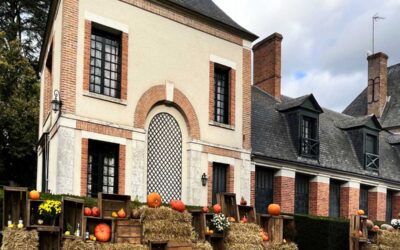Valentine’s Day, also known as Jour de Saint Valentin in French, is one of those days that is celebrated annually around the world on February 14th. So of course the romantic French are not going to be shy about expressing their amour.
It might be a cold winter’s day in February, but this is a day for expressing love and affection to loved ones, friends, and family members. I will note however that Valentine’s isn’t as big a holiday (aka commercial opportunity) in France as it is in North America.
It is more of a “quiet celebration” rather than large balloons and over-the-top exclamations of love. So with that, let’s see how the French celebrate Saint Valentine’s day, shall we? Allons-y!
French origins and traditions of St. Valentine’s day
The origins of Valentine’s Day can be traced back to ancient Rome, brought to France after the Roman conquest of Gaul.
Initially, it was a festival called Lupercalia was celebrated in mid-February. Lupercalia was a fertility festival that involved sacrifices, matchmaking, and the exchanging of love notes. As Christianity spread throughout Europe, the festival was replaced with a Christian holiday, Saint Valentine’s Day.
There were at least 3 christian martyrs named Valentine in the 2nd and 3rd centuries, namely Valentine of Rome, Valentine of Terni and another martyr who lived in North Africa. So it is not entirely clear which one Saint Valentine refers to.
One was reputed to perform marriages for Christian couples in secret. Another legend tells of Saint Valentine falling in love with his jailer’s daughter, to whom he wrote her a letter before his execution, signing it “Your Valentine.”
Loterie d’amour (Lovers’ lottery)
One interesting Valentine’s Day tradition in France was the old “loterie d’amour” or “drawing for love.” This Gaelic tradition involved unmarried men and women drawing lots for the name of a partner with whom they want to spend the evening or continue a relationship until marriage.
If a man did not like the woman who had called out to him, he could reject her and receive an egg in return.
Pope Gelasius I abolished this holiday around 495 and replaced it by decreeing February 14 as the day of love in homage to the patron saint of lovers who is Saint Valentine.
The earliest known Valentine poem
But Valentine’s day really took off in France during the Middle Ages. It was a became a tradition for men to give their beloved small gifts, such as flowers or sweets, on this day.
Much of this was inspired by a French royal prince named Charles, the Duke of Orléans. In the 15th century, the 21-year-old Charles was captured during the Battle of Agincourt and held prisoner in various places including the Tower of London for 25 years.
During this time, he became an accomplished poet and wrote numerous love poems to his wife, Bonne of Armagnac. As was the tradition for royalty, they had married when he was only 14-year-old and she was 10-years-old. (In addition, it was his 2nd marriage as he had previously married at 11!)
It is believed that one of these poems that Charles wrote to Bonne during his captivity became the first Valentine’s Day card. Now, he wrote several poems about Valentine’s day, some romantic and some melancholy, but one of the earliest reads:
| French love poem | English translation |
|---|---|
| Le beau soleil, le jour saint Valentin, Qui apportait sa chandelle allumée, N’a pas longtemps, entra un bien matin | The beautiful sun, on Valentine’s Day, Who brought her lighted candle, Didn’t have long, entered one good morning |
| Privéement en ma chambre fermée. Celle clarté, qu’il avait apportée, Si m’éveilla du somme de Souci, Où j’avaië toute la nuit dormi Sur le dur lit d’ennuyeuse pensée. | Privately in my enclosed room. That clarity, which it brought, If woke me from the sleep of Worry, where I had slept all night On the hard bed of boring thought. |
| Ce jour aussi, pour partir leur butin Des biens d’Amours, faisaient assemblée Tous les oiseaux, qui parlants leur latin, Criaiënt fort, demandants la livrée | This day too, to leave their bounty The goods of Love, gathered together All the birds, speaking their Latin, Shouted loudly, asking for the livery |
| Que Nature leur avait ordonnée; C’était d’un pair comme chacun choisi; Së ne me pu rendormir, pour leur cri, Sur le dur lit d’ennuyeuse pensée. | That Nature had ordained them; It was of a peer as each chosen; Could not put me back to sleep, for their cry, On the hard bed of boring thought. |
| Lors en mouillant de larmes mon coussin, Je regrettai ma dure destinée, Disant: Oiseaux je vous voi en chemin De tout plaisir et joië désirée; | Then, wetting my cushion with tears, I regretted my hard destiny, Saying: Birds I see you on the way Of all desired pleasure and joy; |
| Chacun de vous a pair qui lui agrée, Et point n’en ai, car Mort, qui m’a trahi, A pris mon pair, dont en deuil je langui Sur le dur lit d’ennuyeuse pensée. | Each of you has a partner who pleases him, And I have none, for Death, who betrayed me, Took my partner, whose mourning I languish On the hard bed of boring thought. |
| L’ENVOI Saint Valentin choisissent cette année Ceux et celles de l’amoureux parti; Seul me tendrai, de confort dégarni, Sur le dur lit d’ennuyeuse pensée. | THE SEND Saint Valentines’ day chose this year Those of the departed lover; Alone I will stretch out, with bare comfort, On the hard bed of boring thought. |
The Duke of Orléans was eventually released although and published many of his works, including poetry and manuscripts. His works in English and French, as well as his royal heritage, made him a popular figure whose works were purchased by both the Kings of France and England.
Charles’s beloved wife Bonne however died in France, while he was still in captivity in England, never having borne him children.
Upon his return to France in 1440, Charles married Marie of Cleves whose uncle, the Duke of Burgundy, had finally managed to arrange his release. Charles and Marie had 3 children, two girls and a boy.
His son Louis, who was born when Charles was nearly 70-years-old, would go on to become King Louis XII of France. And thus being the father of a King, the legend of the romantic Duke of Orlèans was born, as well as the valentine tradition of romantic poetry.
Over the centuries, these stories have all amalgamated together to form the basis of the Valentine’s day traditions we celebrate today.
Giving flowers
Like in many countries red roses are the most popular flowers on Valentine’s Day in France. The eternal symbol of love, you are bound to succeed in proclaiming your amour with a bouquet of red roses.

Note, in France red roses are an expression of passionate love, seduction, desire, and so it would be inappropriate to offer red roses to anyone other than a romantic date.
You could also offer pink flowers, which refer to a more playful and tender love. These are traditionally associated with femininity, and perceived as delicate, sweet and charming.
There are all sorts of etiquette rules on giving flowers in France, such as not giving yellow flowers, etc, which you can read more about.
I should note that the French prefer discretion as opposed to loud public exclamations of love. For instance, anecdotally, I’ve never ever seen flowers delivered for Valentines at work here. They would usually be given privately.
Chocolates and candy
Across the country, you will find French chocolatiers and patisseries will offer special Valentine’s Day treats, such as heart-shaped chocolates and charmingly beautiful cakes.

A favorite gift for Valentine’s day is picking several types of small cakes and giving that as a gift for that romantic special occasion.
French expressions
If you are looking for cards to exchange on Valentine’s day, there are plenty of French love quotes, songs and romantic phrases that you can include in your store-bought card to personalize it.
The French are romantics after all, and there are plenty of ways to say “I love you” in French:
| French Love Phrases | English Translation |
|---|---|
| Je t’adore | I adore you. |
| Je t’aime. | I love you. |
| Je t’aime très fort. | I love you very much. |
| Je t’aimerai jusqu’à mon dernier souffle. | I love you till my last breath. |
| je t’aime pour l’éternité. | I love you till eternity. |
| Je t’aime pour toujours et a jamais. | I love you forever and always. |
| Je t’aime de tout mon coeur. | I love you will all my heart. |
| Moi aussi, je t’aime. | Me too, I love you too. |
| Tu es l’amour de ma vie. | You’re the love of my life. |
Other lovely ways to express your feelings in French to the one you love are:
| French Love Phrases without the word “love” | English Translation |
|---|---|
| Je pense toujours à toi. | I always think of you. |
| Tu me manques. | I miss you. |
| Je ne peux pas vivre sans toi. | I can’t live without you. |
| Je ne supporte pas d’être loin de toi. | I cannot bear to be far from you. |
| Je suis amoureux(euse) de toi. | I am in love with you. |
| Je ne supporte pas d’être séparé(e) de toi. | I cannot stand to be away from you. |
| Je pense à toi tout le temps. | I think of you all the time. |
| L’amour est plus fort que tout. | Love is stronger than anything. |
| Je veux être avec toi. | I want to be with you. |
I should note that unlike in North America, small children in France do not usually prepare “valentine’s day cards” for their classmates. This is considered an adult occasion, and kids giving out cards is not encouraged.
Valentine dinner menu
If you’re going for that lovely romantic dinner in Paris, you will have to plan ahead or you will find restaurant reservations difficult to obtain on the big day.
A relatively new phenomenon for Valentine’s day in France is to get a personal chef to come to your home and prepare dinner. As romantic as that sounds, I thought I would put together an ideal French menu for a valentine’s day dinner:
- Entreé (Appetizers): Salmon tartare, foie gras, or Coquilles St. Jacques en Gratin with champagne as an aperitif.
- Plat (Main dishes): Pork chops in mushroom sauce, Lamb roast with rosemary, Sauteed Calamari, Carbonara pasta with Crême fraiche, or French onion risotto, all served with wine.
- Desserts: Baba au Rhum cake, crêpes suzette, or a café gourmand, along with a digestif like cognac.

If you enjoyed that article, you may like to read more about other French holidays and celebrations. A bientôt!




